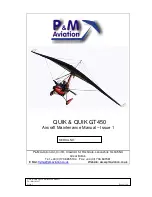
31
CARE AND MAINTENANCE
Looking after your canopy correctly will prolong the life of your paramotoring glider and
enjoyment.
Deterioration: a few tips!
The canopy is mainly made of NYLON cloth which like any synthetic material,
deteriorates through excessive exposure to UV. Hence, it is recommended that you
reduce UV exposure to a minimum by keeping the paramotoring glider packed
away when not in use. Even when packed in the bag do not leave it in the sun.
Keep the canopy and lines as clean as possible. Dirt may penetrate into the fibre
and damage the lines or the cloth.
Ensure that the lines are not folded tightly. It's extremely important to avoid any
sharp bending of the lines, especially the main lines. Pay careful attention to the
lines to avoid damaging them. Any over stretching of lines apart from the strain
imposed during normal flight should be avoided as over stretching is irreversible.
Be careful not to allow snow, sand or stones to enter inside the canopy's cells. The
weight can change the angle of attack or even stall the glider. Additionally, the
sharp edges of foreign material can destroy the cloth!
Check line lengths after tree or water landings. They can stretch or shrink lines.
Never drag the wing over rough ground! This will damage the cloth on the wear
points. When preparing the wing on a take-off with rough ground, don't pull the wing
over it (i.e. by pulling the brakes). Try your best to pack the wing on soft ground.
Uncontrolled strong wind take-offs or landings can result in the leading edge of the
canopy hitting the ground at a high speed which may cause rips in the profile and
damage the rib material.
Clean your glider with fresh water after contact with salt water. Salt water crystals
can reduce line strength even after rinsing in fresh water. Replace lines immediately
after contact with salt water.
Check canopy fabric after water landings with water currents. Waves can place
uneven forces and cause cloth to distort in specific areas. Always remove gliders
from the water by holding only the trailing edge.
Prevent lines from catching on anything as they could be stretched. Do not step on
the lines. Although the lines were tested with a bending test they can be damaged if
stepped on while on a hard surface or if they come into contact with sharp objects.
Don’t always fold the canopy symmetrically to the centre cell. This can cause
constant stress on the same centre cell over time.
Clean your paramotoring glider with only water and a soft sponge. Avoid water
hoses, pressure washers and mashing machines. It is best cleaned by hand.
Do not use any chemicals or spirits for cleaning as these can permanently damage
the cloth.
Summary of Contents for Blaze
Page 1: ...1 ...
Page 10: ...10 TRIMMING ...
Page 35: ...35 LINE PLAN BLAZE GT SCHEME ...
Page 40: ...40 ...










































